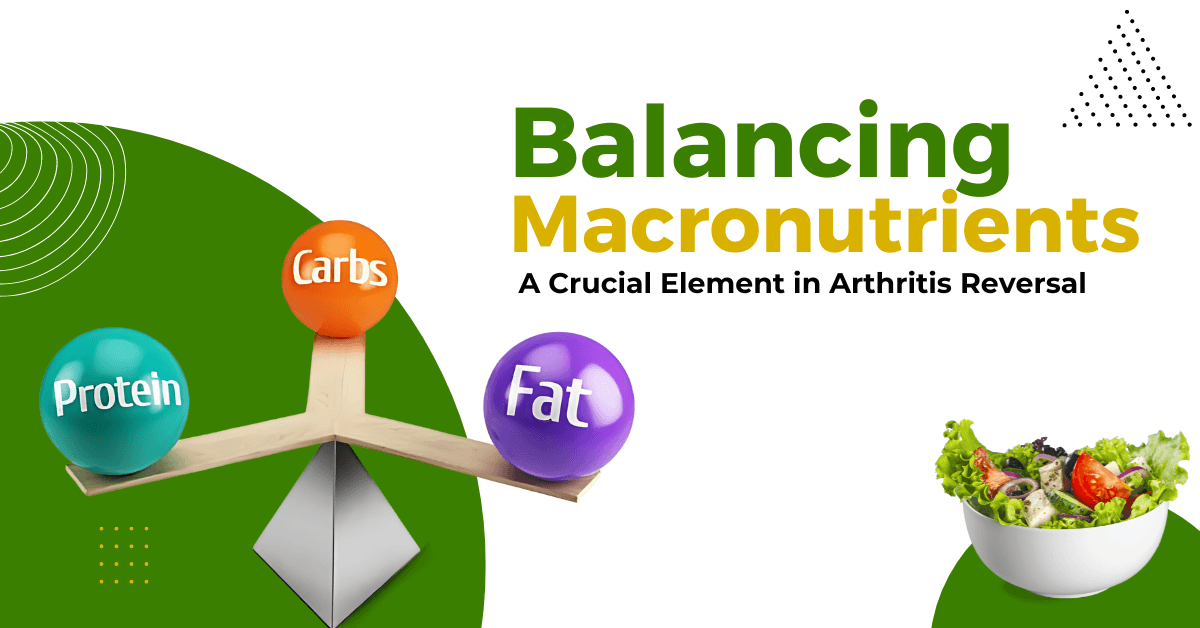Balancing Macronutrients: A Crucial Element in Arthritis Reversal

Supporting Heart Health: The Power of Nutrition, Exercise, and Nitric Oxide
August 10, 2024
Herbal Supplements and Spices for Natural Arthritis Management
August 24, 2024Macronutrients are essential nutrients that provide the energy and raw materials our bodies need to function efficiently. These nutrients are required in relatively large amounts and are vital for our growth, development, and overall well-being.
Our body heavily relies on three primary macronutrients: carbohydrates, proteins, and fats. Each serves a different role in supporting various bodily functions. Carbohydrates are the body's primary energy source, proteins are essential for tissue repair and building, and fats play a crucial role in protecting organs and storing energy. A balanced diet should include the right proportions of these macronutrients. Only then can we maintain optimal health.
It is common to see cases of obesity, underlying medical conditions, and other associated ailments in people with arthritis. Most treatment approaches support proper diet management along with adequate physical activity. That is why monitoring the intake of macronutrients is of prime importance, as a significant portion of our food consists of these.
Understanding Macronutrients and Inflammation
Inflammation triggers arthritis and is responsible for its development and progression. Inflammation may be affected by food, medicines, activities, and others. Macronutrients can also significantly impact inflammation. Thus, understanding them is required to manage arthritis symptoms.
Carbohydrates
Carbs are of two types: simple and complex. Sugary beverages and refined, processed foods contain simple carbs. These increase inflammation and blood glucose levels.Fruits, vegetables, whole grains, legumes, and starchy foods like potatoes are complex carbohydrates rich in antioxidants and fibre. These carbohydrates are ideal for consumption since they help improve arthritis symptoms, gut health, and overall health.
Proteins
Good sources include meat, fish, poultry, eggs, dairy products, legumes, nuts, and seeds. These help build and repair tissues and thus promote the healing of affected joints in arthritis. However, we should avoid processed meats, red meats, and fried foods that contribute to inflammation. Opting for healthier options such as nuts, seeds, and others listed above can control inflammation.
Fats
Fats, or lipids, are organic molecules of carbon, hydrogen, and oxygen atoms. One of their primary roles is to provide energy. Fats also aid in absorbing fat-soluble vitamins (A, D, E, and K) essential for various bodily functions. Moreover, fats contribute to cell membrane structure and have anti-inflammatory properties.
There are three types of fats: saturated, unsaturated, and trans fats. Unsaturated fats are the healthiest, being heart-healthy and found in olive oil, avocados, fatty fish, nuts, and seeds. Due to their anti-inflammatory and healing properties, consuming them can help with arthritis.
Macronutrient Balancing for Arthritis Reversal
How can we leverage the above to create our arthritis-friendly diet? Let's discuss some key strategies:
- Consume more anti-inflammatory foods: Try prioritising fruits, vegetables, whole grains, proteins, and healthy fats. This will provide adequate nutrition and reduce inflammation.
- Limit intake of pro-inflammatory foods: Lower or avoid consuming sugary beverages, refined and processed meals, red meats - which are high in saturated fat, and fried foods.
- Try the Mediterranean Diet: With its benefits of including whole, natural foods, it offers a holistic approach to overall well-being in people with arthritis. With this diet, it is possible to shed those extra calories that help maintain a healthy weight or even promote weight loss. The high fibre content from whole grains, beans, and fruits, as well as the healthy fats from olive oil and nuts, make you feel fuller for longer and lower the likelihood of overeating.
- Personalising your approach: You must experiment with different ratios of macronutrients to see what works for you. You can also see a specialist if you have trouble doing it alone.
All in all, you should opt for a holistic approach when trying to survive with arthritis. Every person is different and may find some approaches better than others. Always do what works best for you. Sleep well, work adequately, and eat healthy, home-cooked food. Avoid foods that worsen your symptoms. If you have any trouble, don't hesitate to consult your healthcare professional.







